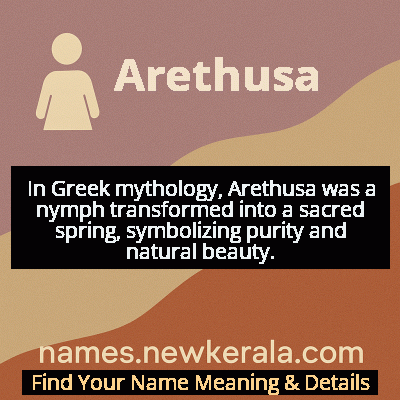Arethusa Name Meaning & Details
Origin, Popularity, Numerology Analysis & Name Meaning of Arethusa
Discover the origin, meaning, and cultural significance of the name ARETHUSA. Delve into its historical roots and explore the lasting impact it has had on communities and traditions.
Name
Arethusa
Gender
Female
Origin
Greek
Lucky Number
3
Meaning of the Name - Arethusa
In Greek mythology, Arethusa was a nymph transformed into a sacred spring, symbolizing purity and natural beauty.
Arethusa - Complete Numerology Analysis
Your Numerology Number
Based on Pythagorean Numerology System
Ruling Planet
Jupiter
Positive Nature
Optimistic, inspirational, and creative.
Negative Traits
Scattered, exaggerating.
Lucky Colours
Yellow, gold, purple.
Lucky Days
Thursday.
Lucky Stones
Yellow sapphire.
Harmony Numbers
1, 2, 9.
Best Suited Professions
Arts, writing, communication.
What People Like About You
Creativity, optimism.
Famous People Named Arethusa
Arethusa of Syracuse
Ancient Greek Nymph/Mythological Figure
Central figure in Greek mythology transformed into a sacred spring, worshipped in ancient Syracuse
Arethusa Gibson
Botanist and Scholar
Pioneering botanical illustrator specializing in Mediterranean aquatic flora
Arethusa Hall
Classical Singer
Celebrated soprano known for interpretations of Greek mythological roles
Arethusa Morgan-Taylor
Archaeologist
Groundbreaking work in underwater archaeology of ancient Greek sites
Name Variations & International Equivalents
Click on blue names to explore their detailed meanings. Gray names with will be available soon.
Cultural & Historical Significance
The myth also reflects ancient Greek understandings of geography and hydrology, personifying the very real phenomenon of underwater rivers and springs that connected different land masses. In Renaissance and Neoclassical art, Arethusa became a popular subject, symbolizing both the rediscovery of classical ideals and the enduring power of nature. Her story has been interpreted through various lenses—as an allegory for artistic inspiration, a symbol of feminine resistance to male pursuit, and an early environmental narrative about the sacredness of water sources. The continued presence of the actual Arethusa spring in modern Syracuse maintains this cultural connection across millennia.
Extended Personality Analysis
Those named Arethusa typically exhibit a personality characterized by depth, adaptability, and quiet strength. Like the mythological spring that flows underground before emerging transformed, Arethusas often possess hidden reservoirs of resilience and the ability to navigate life's challenges with remarkable grace. They tend to be intuitive and perceptive, with an almost psychic ability to understand emotional undercurrents and unspoken truths in relationships. This makes them excellent confidantes and counselors, though they may guard their own inner world carefully. Their connection to water symbolism often manifests as emotional fluidity—they can be serene and reflective like a calm pool, or powerful and transformative like a rushing stream when circumstances demand.
Arethusas typically value authenticity above all else and have little patience for superficiality or deception. They are often drawn to creative expression, environmental advocacy, or healing professions where they can channel their natural empathy and transformative energy. While they may appear reserved initially, they form deep, lasting bonds with those who appreciate their complexity. Their strength lies in their ability to adapt without losing their core identity, much like the nymph who transformed yet remained essentially herself. This combination of mystical depth and practical resilience makes them uniquely equipped to bridge different worlds—whether artistic and scientific, spiritual and practical, or traditional and innovative.
Modern Usage & Popularity
In contemporary naming practices, Arethusa occupies a fascinating niche as a name that is both ancient and surprisingly modern in its appeal. While statistical data shows it remains outside the top 1000 names in English-speaking countries, it has experienced a quiet renaissance among parents seeking names with mythological weight, environmental significance, and feminine power. The name's usage patterns reveal interesting demographic trends: it's particularly popular among academic families, those with Greek heritage, and parents involved in environmental or artistic fields. Modern bearers often appreciate the name's multiple layers of meaning—its connection to water conservation (increasingly relevant in climate-conscious times), its celebration of feminine strength and transformation, and its classical elegance. The name's rarity ensures it stands out in an era of common names, while its mythological background provides rich storytelling potential. Contemporary usage often involves creative nicknames like 'Thea,' 'Retha,' or 'Aria,' making the name both distinctive and adaptable to modern life. Social media and literary references (particularly in fantasy genres) have introduced the name to new audiences, suggesting its usage may continue to grow gradually.
Symbolic & Spiritual Meanings
Arethusa embodies a rich tapestry of symbolic meanings that transcend her mythological origins to speak to universal human experiences. Primarily, she symbolizes transformation and resilience—the ability to undergo profound change while maintaining essential identity. Her journey from nymph to spring represents the soul's capacity for metamorphosis and the idea that our truest nature can emerge renewed through trial. The underground river connecting Greece to Sicily symbolizes intuition, hidden knowledge, and the invisible bonds that connect seemingly separate realms—whether geographical, psychological, or spiritual. As a freshwater source, she represents purity, life-giving energy, and spiritual refreshment in a world often dominated by superficial concerns.
Modern interpretations expand these symbols to include environmental consciousness (as water becomes an increasingly precious resource), feminine empowerment (resisting unwanted pursuit while maintaining autonomy), and the integration of different cultural traditions. Psychologically, Arethusa represents the flow of consciousness between surface awareness and deeper unconscious wisdom. In artistic contexts, she symbolizes creative inspiration that emerges from hidden depths. Her story also carries ecological symbolism about the interconnectedness of water systems and the sacred responsibility to protect natural resources. Ultimately, Arethusa serves as a powerful symbol of how ancient myths continue to provide meaningful frameworks for understanding contemporary challenges and personal growth journeys.

